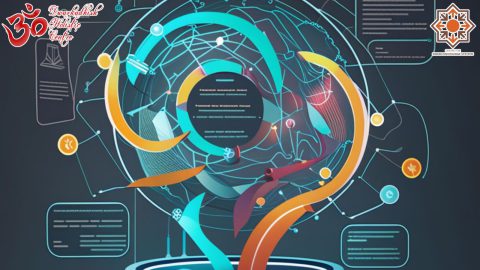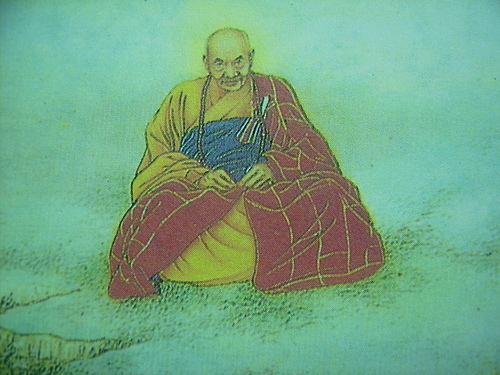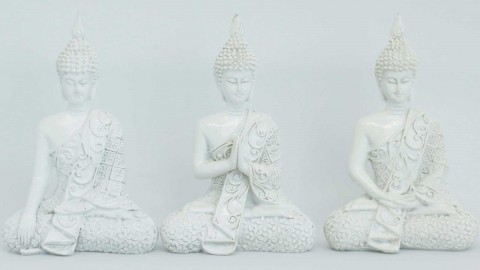In China they developed ammunition for the first time, almost five thousand years back, but they never made any bombs out of it. They made only fireworks. They enjoyed it, they loved it, they played with it, but it was a toy. They never killed anybody through it. They never went too far into it.
The East has discovered many basic things, but has not gone deep into it. It cannot go, because the whole effort is to go within. Science is a Western effort; religion is an Eastern effort. In the West even religion tries to be scientific. That was what Rudolph Steiner was doing: trying to make the religious approach more and more scientific – because in the West, science is valuable. If you can prove that religion is also scientific, then religion also becomes valuable in a vicarious way, indirectly. So in the West, every religious person goes on trying to prove that science is not the only science, religion is also a science. In the East we have not bothered. It is just the other way round: if there was some scientific discovery, the people who had discovered it had to prove that it had some religious significance. Otherwise, it was meaningless.
“By doing this and by meditating, he says we are able to lose our ego and find our ‘I’.”
Rudolph Steiner does not know what meditation is, and what he calls meditation is concentration.
He’s completely confused: he calls concentration meditation. Concentration is not meditation.
Concentration is again a very, very useful means for scientific thinking. It is to concentrate the mind, narrow the mind, focus the mind on a certain thing. But the mind remains, becomes more focused, becomes more integrated.
Meditation is not concentrating on anything. In fact, it is relaxing, not narrowing. In concentration there is an object. In meditation there is no object at all. You are simply lost in an objectless consciousness, a diffusion of consciousness. Concentration is exclusive to something, and everything else is excluded from it. It includes only one thing; it excludes everything else.
For example: if you are listening to me you can listen in two ways: you can listen through concentration; then you are tense, and you are focused on what I am saying. Then the birds will be singing, but you will not listen to them. You will think that is a distraction.
Distraction arises out of your-effort to concentrate. Distraction is a by-product of concentration. You can listen to me in a meditative way; then you are simply open, available – you listen to me, and you listen to the birds also, and the wind passes through the trees and creates a sound; you listen to that also – then you are simultaneously here. Then whatsoever is happening here, you are available to it without any mind of your own, without any choice of your own. You don’t say, “I will listen to this and I will not listen. to that.” No, you listen to the whole existence. Then birds and me and the wind are not three separate things. They are not. They are happening simultaneously, together, all together, and you listen to the whole. Of course, then your understanding will be tremendously enriched because the birds are also saying the same thing in their way, and the wind is also carrying the same message in its way, and I am also saying the same thing in a linguistic way, so that you can understand it more. Otherwise, the message is the same. Mediums differ, but the message is the same, because God is the message.
When a cuckoo goes crazy, it is God going crazy. Don’t exclude, don’t exclude him; you will be excluding God. Don’t exclude anything; be inclusive.
Concentration is a narrowing of consciousness; meditation is expansion: all doors are open, all windows are open, and you are not choosing. Then of course, when you don’t choose you cannot be distracted. This is the beauty of meditation: a meditator cannot be distracted. And let that be the criterion: if you are distracted, know that you are doing concentration, not meditation. A dog starts barking – a meditator is not distracted. He absorbs that too, he enjoys that too. So he says, “Look… so God is barking, in the dog. Perfectly good. Thank you for barking while I’m meditating. So you take care of me in so many ways,” but no tension arises. He does not say, “This dog is antagonistic. He is trying to destroy my concentration. I am such a religious, serious man, and this foolish dog… What is he doing here?” Then enmity arises, anger arises. And you think this is meditation? – No, this is not worth it if you become angry at the dog; poor dog who is doing his own thing. He is not destroying your meditation or concentration or anything. He is not worried about your religion at all, nor about you. He may not even be aware of what nonsense you are doing. He’s simply enjoying his way, his life. No, he is not your enemy.
Watch… if one person becomes religious in a house, the whole house becomes disturbed because that person is continuously on the verge of being distracted. He’s praying; nobody should make any sound. He’s meditating; children should remain silent, nobody should play. You are imposing unnecessary conditions on existence. And then if you are distracted and you feel disturbed, only you are responsible. Only you are to be blamed, nobody else.
What Rudolph Steiner calls meditation is nothing but concentration. And through concentration you can lose the ego and you will gain the ‘I’, and the ‘I’ will be nothing but a very, very subtle ego. You will become a pious egoist. Your ego will now be decorated in religious language, but it will be there.
“The central figure for him is Christ, whom he differentiates from Jesus as a totally different being.”
Now, for a meditator there cannot be any central figure. There need not be. But for one who concentrates, something is needed to concentrate upon. Rudolph Steiner says Christ is the central figure. Why not Buddha? Why not Patanjali? Why not Mahavir? Why Christ? For Buddhists, Buddha is the central figure, not Christ. They all need some object to concentrate upon, something on which to focus their minds. For a religious man there is no central figure. If your own central ego has disappeared, or is disappearing, you need not have any other ego outside to support it. That Christ or Buddha is again an ego somewhere. You are creating a polarity of I-thou. You say, “Christ, thou art my master,” but who will say this? An ‘I’ is needed to assert. Look, listen to Zen Buddhists. They say, “If you meet Buddha on the way, kill him immediately.” If you meet Buddha on the way, kill him immediately, otherwise he will kill you. Don’t allow him a single chance, otherwise he will possess you and he will become a central figure. Your mind will arise around him again. You will become a Buddhist mind. You will become a Christian mind. For a certain mind, a certain central object is needed.
And of course, he is more in favor of Christ than Jesus. That too has to be understood. That’s how the pious ego arises. Jesus is just like us: a human being with a body, with ordinary life; very human.
Now, for a very great egoist this won’t do. He needs a very, very purified figure. Christ is nothing but Jesus purified. It is just like if you make curd out of your milk, then take cream out of it, and then you make ghee out of the cream. Then ghee is the purest part, the most essential. Now you cannot make anything out of ghee. Ghee is the last refinement, the white petrol. From kerosene, petrol; from petrol, white petrol. Now, no more; it is finished. Christ is just the purified Jesus. It is difficult for Rudolph Steiner to accept Jesus, and it is difficult for all egoists. They try to reject it in many ways.
For example: Christians say that he was born out of a virgin. The basic problem is that Christians cannot accept that he was born just like we ordinary human beings. Then he will also look ordinary.
He has to be special, and we have to be followers of a special Master. Not like Buddha, born out of ordinary human love, ordinary human sexual copulation, no – Jesus is special. Special people need a special Master, out of a virgin. And he’s the only begotten Son of God, the only. Because if there are other sons, then he is no longer special. He is the only Christ, the only one who has been crowned by God. All others, at the most, can be messengers, but cannot be of the same level and plane as Christ. Christians have done it in their own way, but I would like you to understand Jesus more than Christ – because Jesus will be more blissful to understand, peaceful to understand, and will be of great help on the path. Because you are in the situation of being a Jesus; Christ is just a dream.
First you have to pass through being a Jesus, and only then someday will Christ arise within you.
Christ is just a state of being, just as Buddha is a state of being. Gautama became Buddha; Jesus became Christ. You can also become Christ, but right now Christ is too far. You can think about it and create philosophies and theologies about it, but that is not going to help. Right now it is better to understand Jesus, because that is where you are. That is from where the journey has to start. Love Jesus, because through loving Jesus you will love your humanity. Try to understand Jesus, and the paradox, and through that paradox you will be able to feel less guilty. Through understanding Jesus you will be able to love yourself more.
Now, Christians go on trying somehow to drop the paradox of Jesus through bringing the concept of Christ. For example: there are moments when Jesus is angry, and it is a problem; what to do?
It is very difficult to avoid the fact because many times he is angry, and that goes against his very teaching. He continually talks about love, and is angry. And he talks about forgiving your enemies – not only that, but loving your enemies – but he himself lashes out his anger. In the temple of Jerusalem he took a whip, started beating the money changers, and threw them out of the temple singlehanded. He must have been in a real fury, in a rage, almost mad. Now this… how to reconcile this? The way that Christians have found to reconcile – and Rudolph Steiner bases his own ideology on it – is to create a Christ, which is completely reconciled. Forget all about Jesus; bring a pure concept of Christ. You can say at that moment, “He was Jesus when he was angry.” And when he said on the cross, “God my Father, forgive these people, because they don’t know what they are doing,” he was Christ. Now the paradox can be managed. When he was moving with women he was Jesus; when he told Magdalene not to touch him he was Christ. Two concepts help to figure things out – but you destroy the beauty of Jesus, because the whole beauty is in paradox.
There is no need to reconcile, because deep in Jesus’ being they are reconciled. In fact, he could become angry because he loved so much. He loved so tremendously, that’s why he could become angry. His anger was not part of hatred, it was part of his love. Have you not sometimes known anger out of love? Then where is the problem? You love your child: sometimes you spank the child, you beat the child, sometimes you are almost in a fury, but it is because of love. It is not because you hate him. He loved so much – that’s my understanding of Jesus – he loved so much that he forgot all about anger and he became angry. His love was so much. He was not just a dead saint, he was an alive person; and his love was not just philosophy, it was a reality. When love is a reality, sometimes love becomes anger also.
He was as human as you are. Yes, he was not finished there. He was more than human also, but first and basically he was human, human plus. Christians have been trying to prove that he was superhuman and that humanity was just accidental, a necessary evil because he had to come into a body. That’s why he was angry. Otherwise, he was just purity. That purity will be dead.
If purity is real and authentic, it is not afraid of impurity. If love is true it is not afraid of anger; if love is true it is not afraid of fighting. It shows that even fighting will not destroy it; it will survive. There are saints who talk about loving humanity, but cannot love a single human being. It is very easy to love humanity. Always remember: if you cannot love, you love humanity. It is very easy, because you can never come across humanity, and humanity is not going to create any trouble. A single human being will create many troubles, many more. And you can feel very, very good that you love humanity. How can you love human beings? – You love humanity. You are vast, your love is great. But I will tell you: love a human being; that is the basic preparation for loving humanity. It is going to be difficult, and it is going to be a great crisis, a continuous crisis and challenge. If you can transcend it, and you don’t destroy love because of the difficulties but you go on strengthening your love so that it can face all difficulties – possible, impossible – you will become integrated. Christ loved human beings, and loved so much, and his love was so great that it transcended human beings and became the love for humanity. Then it transcended humanity and became love for existence. That is love for God.
“Your way seems different to me.”
Not only different; it is diametrically opposite. In the first place, it is not a way at all. It is not a path, or if you love the word then call it a pathless path, a gateless gate. But it is not a path, because a path or way is needed if your reality is far away from you. Then it has to be joined by a path. But my whole insistence is that your reality is available to you right now. It is just within you. A path is not needed to reach it. In fact, if you drop all paths, you will suddenly find yourself standing in it. The more you follow paths, the farther away you go from yourself. Paths misguide, mislead, because you are already that which you are seeking. So paths are not needed, but if you are trained to think in those terms, then I will say that my way is diametrically opposite. Steiner says right-thinking; and I say, right or wrong, all thinking is wrong. Thinking as such is wrong; no-thinking is right.
“Can you please advise me? because I am somehow torn between you and the way Steiner shows.”
No, you will have to remain in that state of tension for a few days. I will not advise and I will not help.
Because if I advise and I help you, you can come and lean towards me; that may be immature. You will have to have a good fight with Steiner before you can come to me, and he will certainly give you a good fight. He is not going to leave you so easily. And I’m not going to give you any help, so that you come on your own. Only then do you come, when you come on your own. When a fruit is ripe it falls on its own accord. No, I will not throw even a small stone at it, because the fruit may not be ripe and the stone may bring it down… and that will be a calamity. You would remain in your torn state of mind.
You will have to decide, because nobody can remain in a torn state of mind for long. There is a point where one has to decide. And it will not be just towards Rudolph Steiner if I help you. He’s dead; he cannot fight with me. It is easier for me to pull you towards me than it will be for him. So to also be just to him it is better that I leave it to you. You just go on fighting. Either you will drop me… that will also be a gain, because then you will follow Rudolph Steiner more totally.
But I don’t think that is possible now… the poison has entered you. Now it is only a question of time.
Tags: Drop The Paradox Patanjali










